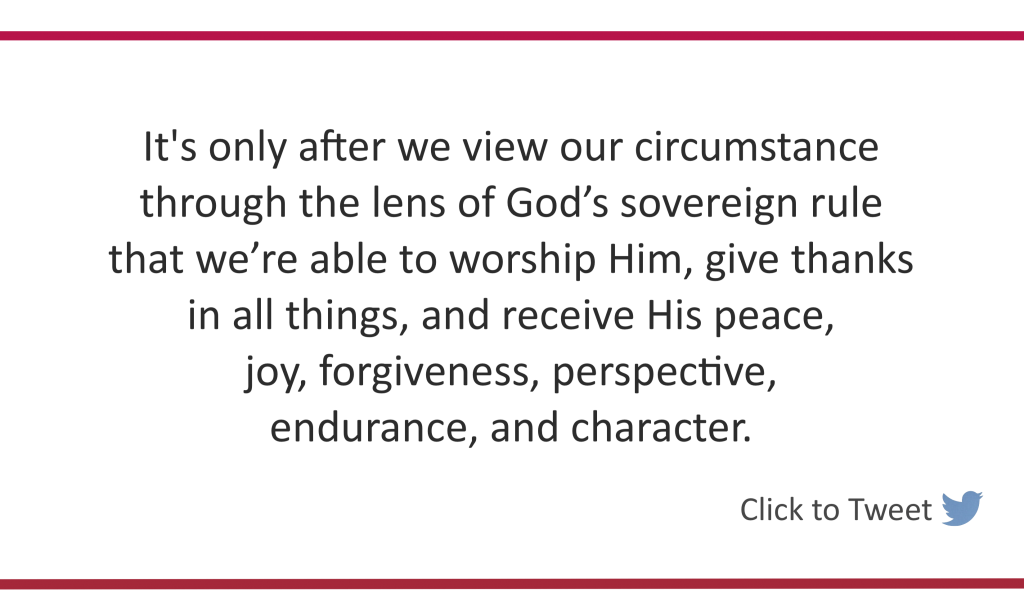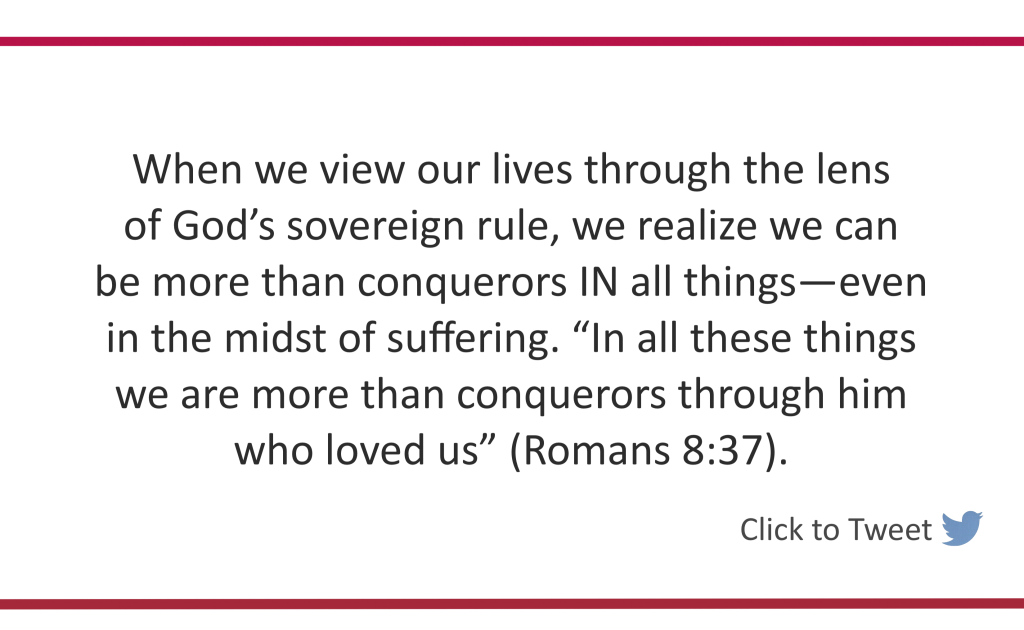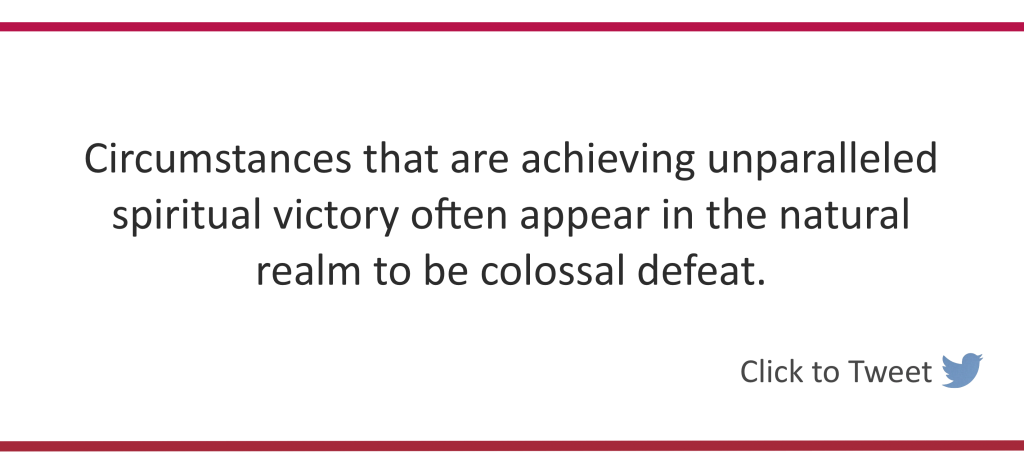Seesaw Control: How Perspective Draws Victory from Defeat (Sovereign Rule, Part 4)

We twenty-first century Christians take an approach to God’s sovereignty that is similar to a piece of playground equipment—the seesaw. We believe that one day God is in control of our lives, and the next day Satan or an evil person has gained control over Him.
It’s as if today the seesaw tilts to the side where God sits, so that He wields all the power over life’s events. But tomorrow the seessaw rocks to the other side side, and someone else gains the reigns of the world … temporarily at least, until the seesaw tilts again.
Under this scenario, control of the world shifts back and forth between God and an opposing force—be it Satan, an evil person, or something as void of intent as weather events.
We don’t admit it aloud, perhaps, but we think God controls only the positive scenarios of this world, that somehow His authority stops where negative effects begin.
We rationalize: Surely God did not have the power to stop the harm that occurred. His love would have made Him want to block the negative event, so He must have been powerless to do so. Another force must have wrestled control away from God during those events that hurt us personally or wreaked havoc on society. God was not in control, because there’s no way He could have known beforehand that it was going to happen… and yet have done nothing to have stopped it.
Effects of This Unscriptural “Seesaw” Belief
This “seesaw” belief is unscriptural. It contradicts what the Bible teaches. (read this for scriptural evidence). In addition, it causes bondage and harms the one who holds it.
This belief robs us of:
- peace …
- contentment …
- fellowship with God …
- perseverance …
- proven character …
- growth …
- maturity …
- transformation to the image and character of Christ.
It fosters:
- anger …
- bitterness …
- depression …
- despair …
- impatience …
- discontentment …
- spiritual immaturity.
Benefits of the Biblically Correct View
When we look through lens of God’s sovereign rule, we see that God holds our lives in the palm of His hand. Nothing is allowed to touch us unless it has been filtered through His fingers of love. Out of His infinite wisdom and love, God allows only the difficulties that will work for our good and His glory. Only the circumstances that will benefit us and reveal His character are allowed to seep through His protective fingers.
Viewing our circumstance from God’s eternal perspective, we begin to trust His higher, wiser ways and value things of eternal significance above the temporal.
It is only after we truly view our circumstance through this lens that we’re able to worship God and give thanks in all things. It is only then that we’re able to receive:
- His peace
- His joy
- His perspective
- His forgiveness
- His contentment
- His endurance
- His hope
- His character.

More Than Conquerors In All Things
When we rest in God’s sovereign rule and receive these wonderful benefits, we realize we can be more than conquerors IN all things—even in the midst of suffering.
Romans 8:37 says:
“In all these things we are more than conquerors through him who loved us.”
“Surely that’s not right,” you say. “Surely this passage is not stating that I can be more than a conqueror in my current suffering. This affliction is having me for lunch! Surely “all” these things means just the happy things, the pleasant things, the easy things.”
Ah, but I skipped an important verse. Two verses earlier, Romans 8:35 says:
“Who shall separate us from the love of Christ? Shall trouble or hardship or persecution or famine or nakedness or danger or sword? … In all these things we are more than conquerors through him who loved us.” (v. 35, 37 NIV, emphasis added)
In trouble, in hardship, in hunger, in danger, in destitution, in threat of death—even in all these things we are more than conquerors through Jesus Christ.
Romans 8:37 does not say, “Only in prosperity, ease, and sufficiency are we more than conquerors.”
So we’ve established that the word “all” is pretty important to understanding the meaning of this verse. But so is the word “in.”
Romans 8:37 does not say, “Only after we’ve been delivered from our hardships are we more than a conquerors. When there is victory in the temporal realm, then we are victorious, then we are more than conquerors.”
No—you and I are more than conquerors through Jesus Christ right now, in whatever our undesirable circumstance is this very minute.

What the “Seesaw” Belief Declares and Defines
The mentality that one day God is in control and the next Satan or another being is in control incorrectly declares that no good can come from your suffering until it is removed.
The seesaw belief essentially defines your suffering as wrong, or bad, from God’s perspective—because your affliction is something a good, loving God would not want to happen in your life and would certainly never use for your good and His glory. Therefore, there is no eternal, Divine purpose for your suffering, Because if, after all, Satan usurped God’s control and perpetrated your affliction against God’s will, then there is no redeeming, eternal value in the situation.
Therefore, under this false perception, the only position of victory is the absence of your suffering. If God cannot use it, then the only good that can possibly come from it is its removal.
This false belief equates what is victorious in the flesh with what is victorious in the Spirit. It denies that victory in the spirit comes through crucifixion of the flesh. (See Matthew 16:24, Romans 8:6-14; Galatians 2:20, 5:24, John 6:63, 12:24.) This is dangerous territory spiritually.
Was it Defeat … or Victory?
What if this view—equating what is victorious in the flesh with what is victorious in the Spirit—had been the pervasive view of Paul, Jesus, Joseph and Job?
Paul’s thorn would not have been a cause for God’s grace to have been made sufficient and Christ’s power to have rested on him as a result (2 Cor. 12:9-10). He would not have boasted, or been “loud tongued” about his weaknesses, insults, hardships, difficulties and persecutions. When he was weak… he would have simply remained weak, and not been made strong in Christ.
As for Jesus on the cross? His death would have been deemed by God an utter failure. Jesus would not have been crucified in plan and purpose before the foundation of the world. (Rev. 13:8) He would not have been “handed over… by God’s deliberate plan and foreknowledge.” (Acts 2:23) Instead, Satan would have overpowered God and achieved the greatest victory in the history of the world, triumphing over the King of Kings and destroying God’s redemptive plan. There would have been no atonement for our sins. You and I would be condemned to eternity in hell. … Or so we would think IF we adopted the view that the way things appear in the natural is the true state of affairs.
Joseph’s captivity? There would have been no forgiveness of his brothers. Joseph never would have said, “Don’t be grieved and angry with yourselves, because it wasn’t you who sent me here, but God” (see Ge.45:5-8). Instead, he would have declared, “Despise yourselves because you wrecked God’s plans and ruined my life.”
And Job? There would be no closing chapters of his story. His friends would have simply been right. Job never would have said, “I know O Lord that You can do all things; no plan of yours can be thwarted.” The eyes of His heart would never have seen God (see Job 42:2, 5). Job would have missed the one thing that gave him ultimate happiness and joy.
Circumstances that are achieving unparalleled spiritual victory often appear in the natural realm to be colossal defeat.

A Pastor’s Misconception
When I began to emerge from the years of severe illness, I was asked to sing at my church. The good-intentioned pastor introduced me and the song I was going to sing. This pastor wasn’t personally familiar with my previous years of suffering. He had only heard about them. I was new to the church, and he was new as pastor.
“Natalie has been very sick,” he said as he introduced me. “But the devil isn’t going to win today. He has tried to take Natalie out, but as she comes to sing, he’s going to lose,” he said.
My heart broke for this man who obviously did not understand the ways, the character, and the truth of God. I also hurt for others in the congregation who were enduring circumstances that appeared, from a mere human standpoint at least, to be defeat. What this pastor’s remarks insinuated were:
- Satan has been and is currently winning in Natalie’s life. She was bed-ridden and house-bound, therefore Satan was in control.
- But when Natalie comes and sings, (and does something that appears to be victorious in man’s temporal eyes) then Satan will be defeated.
Perhaps the pastor was just saying this as a cliche, without much thought. If so, he should have been more careful, because his statement dangerously presented things from a natural, earthly standpoint. It seemed he was clueless as to the way things were in the Spirit.
In fact, the pastor had it all backward. He could not have been more wrong. Satan wasn’t winning in the middle of the illness either. God had never been working more in my life than during those years of suffering. I have never been freer and more fulfilled than when I was stripped of every selfish ambition, every human ability and everything my self-will could actualize. I’ve never been more liberated from bondage than when I was most crucified in my flesh. If ever God was winning, it was in the very things that appeared to others like defeat. Triumph came disguised as a cross.
I have never had to live by the life of Jesus and His Word more—literally existing by it, as God exhorts us to do—than during those years of intense suffering. Living by the life of Christ wasn’t an option for me then. My flesh was crucified and essentially ‘dead.’ So if anything lived, if anything existed, if anything conquered, it was the resurrection power of Jesus Christ in me. Now that is victory.
Because I experienced involuntary crucifixion of my flesh and the resurrection power that results, I now know what to seek voluntarily each day. And to the degree that my self-will prevails, I am thankful for the amount of illness that remains, because it’s still a tool God uses to rid me of sin, self-worship, and temporal values. It helps keep me humble, submissive and pliable before God. And most of all, it forces me to live dependent upon Him.
Yes, God knew full well what He was doing when through His sovereign rule, He lovingly allowed me a season on the cross. And He knows what He is doing in allowing your crosses and losses as well.
The Confrontational Language of the Cross
In When Heaven Is Silent, Ron Dunn states,
In our attempt to win the world by impressing the world, we have abandoned the confrontational language of the cross for the wooing language of power, might, success, and winning. The true power of our faith is power that the world calls weakness, and the victory of our faith is victory that the world calls failure. The Christ we profess to follow was made “perfect through suffering.” We prefer to be made perfect through success. But grace will not do for us what it did not do for Christ—exempt us from suffering. [1]
God has spiritual victory, power, and maturity in mind when He allows us to go through seasons of suffering.
Statements such as the one my pastor made are inaccurate. Such shallow generalizations don’t tell the whole story—the “fruit-bearing” story that God is behind it:
- “I am the LORD and there is no other, the One forming light and creating darkness, causing well-being and creating calamity; I am the LORD who does all these” (Isaiah 45:6-7).
- “Consider what God has done: Who can straighten what he has made crooked? When times are good, be happy; but when times are bad, consider; God has made the one as well as the other” (Ecclesiastes 7:13-14).
Don’t let your craving for temporal comfort distort your theology. God is in control. He only allows what is best to enter our lives.
“You intended to harm me, but God intended it for good to accomplish
what is now being done, the saving of many lives.”
Genesis 50:20 (emphasis added)
–
More Tweetables
- We Christians take an approach to God’s sovereignty that is similar to a piece of playground equipment—the seesaw. We believe that one day God is in control of our lives, and the next day Satan or an evil person has gained control.
Tweet
- The belief that one day God is in control of our lives and the next day Satan has gained control robs us of peace, contentment, fellowship with God, perseverance, proven character, growth, and transformation to the image and character of Christ.
Tweet
- Believing that God is not sovereign, that one day God is in control of our lives and the next day Satan or someone has gained control, fosters anger, bitterness, depression, despair, impatience, and discontentment
Tweet
- The mentality that one day God is in control and the next Satan or another being is in control incorrectly declares that no good can come from our suffering until it is removed.
Tweet
- “I’ve never been more liberated from bondage than when I was most crucified in my flesh. If ever God was winning, it was in the very things that appeared to others like defeat. Triumph came disguised as a cross.” ~ @NatalieGNichols
Tweet
- “In our attempt to win the world by impressing the world, we have abandoned the confrontational language of the cross for the wooing language of power, might, success, and winning.” ~ Ron Dunn
Tweet
- “The true power of our faith is power that the world calls weakness, and the victory of our faith is victory that the world calls failure.”
~ Ron DunnTweet
- “The Christ we profess to follow was made “perfect through suffering.” We prefer to be made perfect through success. But grace will not do for us what it did not do for Christ—exempt us from suffering.” ~ Ron Dunn
Tweet
- “Consider what God has done: Who can straighten what he has made crooked? When times are good, be happy; but when times are bad, consider; God has made the one as well as the other.”
~ Ecclesiastes 7:13-14Tweet
–
Questions:
- Do you feel that the seesaw of power sometimes tilts away from God’s end, that something or someone has more power over certain circumstances of your life than God?
- Are you angry, depressed, hopeless, impatient, or discontented in your trial?
- Have you submitted to God’s sovereign rule over your circumstance and received the gifts God wants to give you in the midst of your hardship?
- Have you let God make you more than a conqueror right there in the middle of your unwanted circumstance?
- Do you believe that God can bring good from your situation right now? Or do you believe that the only position of victory is the absence of your affliction? Are you equating what is victorious in the flesh with what is victorious in the Spirit?
- What circumstance in your life appears like total defeat? Has it occurred to you that God could be using that situation to give you unparalleled victory—that your triumph could have come disguised as a cross?
- Do you profess to follow Christ but prefer to be made perfect through success rather than through through suffering? Do you believe grace will do for you what it did not do for Christ—exempt you from suffering?
OTHER ARTICLES IN THIS SERIES:
- Part 1: His Throne Rules Over All
- Part 2: Filtered Through His Fingers of Love
- Part 3: The Apple and the Alien
- Part 5: Do God and Satan Alternate Shifts?
- Part 6: God Governs Hands-On, Using Even Evil for His Purpose
- Part 7: His Purpose Prevails: God’s Control Over Sinful Acts
- Part 8: Biblical Evidence: Scriptures About God’s Sovereign Rule
- Resting in God’s Sovereign Rule: The Complete Series
RELATED ARTICLES:
- Overcoming Adversity 101, Part 3: What About Accidents?
- Overcoming Adversity 101, Part 4: The Long Ranger
- Overcoming Adversity 101, Part 5: Is God Good and Loving?
- Overcoming Adversity 101, Part 6: A Few Reasons Why
- Overcoming Adversity 101, Part 7: A Few More Reasons Why
- Overcoming Adversity 101, Part 8: Ten Final Reasons Why
- Overcoming Adversity 101, Part 9: Sovereignty vs. Healing
___________________
- Ron Dun, When Heaven is Silent (Nashville, TN: Thomas Nelson, 1994), 36

Disclosure of Material Connection: Some of the links in the post above are “affiliate links.” This means if you click on the link and purchase the item, Shades of Grace will receive an affiliate commission. Regardless, I only recommend products or services I use personally and believe will add value to my readers. I am disclosing this in accordance with the Federal Trade Commission’s 16 CFR, Part 255 “Guides Concerning the Use of Endorsements and Testimonials in Advertising.”






 “Natalie Grace Nichols is experiencing God’s grace and freely expressing it. My wife, Betty, and I thank God for the ministry of Jesus through Natalie.”
“Natalie Grace Nichols is experiencing God’s grace and freely expressing it. My wife, Betty, and I thank God for the ministry of Jesus through Natalie.” “I’m so thankful that God is raising up women like Natalie for a new generation, providing biblically balanced teaching, encouragement, and comfort for people who are enduring life’s trials.”
“I’m so thankful that God is raising up women like Natalie for a new generation, providing biblically balanced teaching, encouragement, and comfort for people who are enduring life’s trials.”
Wow, powerful stuff here! This speaks to me completely. I struggle with GAD and everything is a "what-if?" and I hate it and I hate how it controls me and my wonderful husband gently reminds me "God is in control, right?" It's speaking to me now as I'm still struggling with the death of some young people – Nabeel Qureshi – the apologist with stage 4 stomach cancer who passed away 6 months ago and how his testimony of healing could have been so amazing, but it wasn't. His wife is an absolutely amazing woman who has stayed faithful to god despite her sufferings. At his death she said "And God is Still Good." I want that too.
[…] Seesaw Control: How Perspective Draws Victory from Defeat (Resting in God’s Sovereign Rule, Part 4) […]